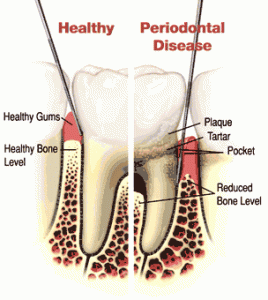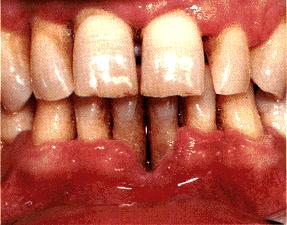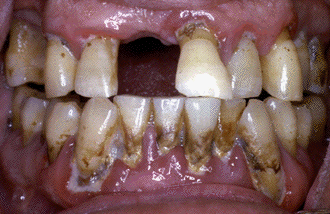972-241-4433
Teeth cleaning (also known as prophylaxis, literally a preventative treatment of a disease) is a procedure for the removal of tartar (mineralized plaque) that may develop even with careful brushing and flossing, especially in areas that are difficult to reach in routine tooth brushing. It is often done by a dental hygienist or a dentist. Professional cleaning includes tooth cleaning and tooth polishingand debridementif too much tartarhas accumulated. This involves the use of various instruments or devices to loosen and remove deposits from the teeth.If plaque and tartar is left on the teeth, it provides the right conditions for bacteria to thrive. The bacteria irritate the gums, which means that they bleed more easily. You may notice this if you are brushing your teeth, or eating, and sometimes your gums may bleed a bit. This is the early stage of gum disease c

alled gingivitis. If gingivitis not treated and nothing is done about it, the inflammation will work its way down towards the foundations of the tooth causing a “periodontal pocket”. Again, within the confines of the pocket, the conditions are such that the bacteria can have a right old party, and cause more damage.
Gum disease can break down the support (bone) structures of the teeth, so that eventually, they will become loose. The problem is that until it gets quite severe, the person often has no symptoms. Sadly, the damage to the support structures of the teeth is irreversible. The good news is that if gum disease is caught in time, its progression can be halted and improved upon, and that is the key. To stop gum disease from progressing, your dentist may advise periodontal therapy, or deep cleaning. This gets rid of the bacteria in the pocket and provides the necessary conditions for healing to occur.
What is the difference between an ordinary cleaning and deep cleaning?
There is some confusion about the difference between scaling and deep cleaning or root planning. Scaling is basically the process of removing dental tartar from the surfaces of the teeth. Root planning is the process of smoothing the root surfaces and removing any infected tooth structure. If you have gum disease or gum pocketing, the gum pockets around the teeth will have deepened, thereby allowing tartar deposits to form under the gum line.
The two processes tend to blur together since during the cleaning process, Dr. Haghiri scales away tartar and performs any necessary root planning at the same time. Any roughness can be planed away to result in a silky smooth surface.
Does it hurt?
Depending on the depth of the pocket and severity of the root surface irregularity, Dr. Haghiri will make the area numb so that the process is comfortable for you.
As an alternative to injectable anesthetics, Oraqix might be an option to try with deeper pocket cleaning. It is a special non-injection device that delivers topical anesthetic gel gently into the gum pockets thereby avoiding numbing of the lips and or tongue as can occur with injected local anesthetics. Oraqix mostly numbs the gum pocket itself so it may not be effective in eliminating sensations in the teeth themselves. Some offices may not have this device so it’s best to check with your dental office.
Sometimes if the pockets are not too deep, there may be little or no discomfort during the procedure – even without numbing. The only sensation may be the physical scraping feeling along the teeth as the area is cleaned and smoothened. A root planed root surface free of tartar has a better chance of allowing the gum tissues to heal and reattach to it. As a result, some deep gum pockets can be reduced after a deep cleaning.
How long does it take?
Typically with deeper pockets and extensive rough root surfaces, the deep scaling and root planning procedure might be broken down into quadrants of work per appointment. For example, the upper right side of the mouth might be worked on one day, and the three other parts worked on at separate appointments. Or alternatively, one half of the mouth (right or left, upper or lower) might be cleaned per appointment. This also allows for only a part of the mouth being frozen at a time and makes for more manageable, shorter appointments.
Dr. Haghiri may use antibiotic gels within the periodontal pocket, again to remove any nasty bugs, or may rinse out the pocket with various medications such as chlorhexidine.
Regular and deep dental cleaning in most dentist offices are done by a dental hygienist, however in American Dental Center we take pride to say that every single dental procedure is done by a State Licensed Dentist.
American Dental Center recommends your teeth professionally cleaned every six months. More frequent cleaning and examination may be necessary during treatment of dental and other oral disorders. Routine examination of the teeth is recommended at least every year.
Cost of Deep Cleaning:
Here at American Dental Center, our staff will do their best to provide the best treatment with lowest cost to their ability. Our staff will contact your insurance provider and try to get as much benefit as you are owed toward a deep cleaning procedure. should you have no insurance and have to pay out of pocket for the procedure, American Dental Center will provide wide variety of options for your to make it more comfortable to deal with the payment part. Unfortunately since delaying deep cleaning procedure may cause the increase of Periodontal disorders, the procedure must be done as soon as possible, and patient cannot wait until he or she is financially prepared. Our office offers a 12 months no interest payment plan through care credit which is very convenient for most of our patients who are not financially prepared. The charges for deep cleaning is listed $245 per quadrant. Our price here in American Dental depending on the severity of the case, the cost could vary anywhere from $220.00 per quadrant up to $300.00 per quadrant excluding any prep cost.


